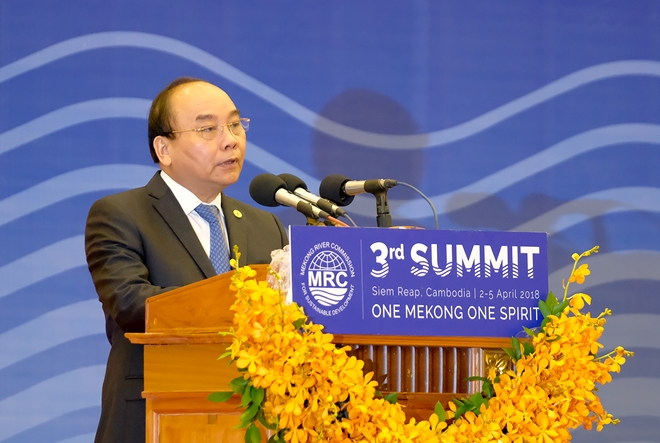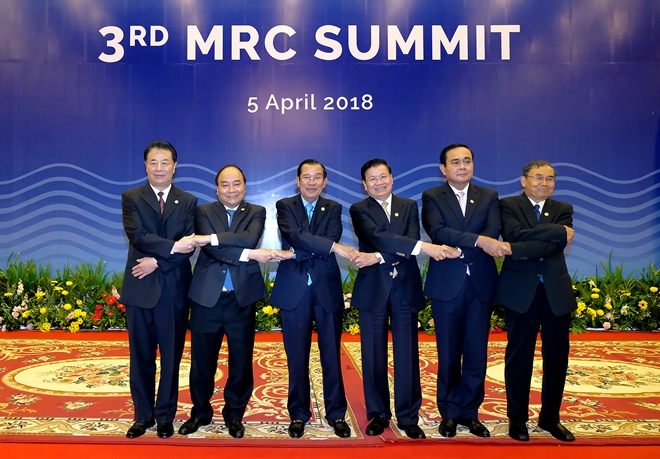PM Phuc underscores rational and sustainable use of water resources of Mekong River
- PM Phuc leaves for third MRC Summit in Cambodia
- Vietnam contributes to sustainable development in Mekong River
On April 5, Prime Minister Nguyen Xuan Phuc and his delegation attended a plenary session of the third Mekong River Commission (MRC) Summit in Siem Riep, Cambodia along with the Prime Ministers of Vietnam, Laos, Cambodia, and Thailand.
Prominent guests at the meeting were also the Minister of Water Resources of China and the Minister of Environment of Mynamar-the two dialogue countries of the MRC and representatives of other development partners.
Themed “'Enhancing Joint Efforts and Partnerships towards Achievement of the Sustainable Development Goals in the Mekong River Basin,” the summit reviewed cooperation within the commission and the implementation of commitments made at the second summit in Vietnam’s Ho Chi Minh City in 2014, while identifying future priority areas.
 |
The leaders pledged their best efforts to bolster the Mekong cooperation, uphold the Commission's role in realizing the Sustainable Development Goals (SDGs) across the region, and step up cooperation with ASEAN, the Mekong-Lancang Cooperation, and the Greater Mekong Sub Region.
The summit adopted the Siem Riep Declaration which acknowledges the Commission's achievements, points out challenges and opportunities for the region, and identifies priorities in the next four years and further cooperation orientation.
In his address, PM Nguyen Xuan Phuc said the Vietnamese government prioritizes responses to negative impacts in the Mekong delta region caused by climate change, extreme weather, and human activities.
He underlined the need to equally, promptly, and sustainably use water resources and other resources of the Mekong River.
 |
PM Phuc emphasized the major concern of the Vietnamese Government is how to cope with negative impacts caused by climate change in the Mekong Delta region, extreme weather phenomena and human activities. "We need to fully, practically, and effectively implement the 1995 Mekong Agreement as well as the Commission's regulations, increase its monitoring and coordination role in the realization of commitments by member countries. We need to work out a regional development strategy in harmony with water resource plans of member countries and framework plan on sustainable use of the Mekong River’s water resources. It’s necessary to share information and data in the Mekong-Lancang region,” he said.
The Mekong River basin is now facing huge challenges such as rapid population growth, unsustainable exploitation of water resources, land and forests, climate change, extreme weather, and abnormal natural disasters. As a consequence, the Mekong River's water resources are being depleted both in quantity and quality, resulting in a degradation of ecosystems and the environment, he said.
"There should be practical and timely actions in order to help the Mekong River Delta- the granary of the region for hundreds of years- to further grow as a great supply of rice to ensure regional food security," he stressed.
Discussions with international scientists and experts identified the urgent need to carry out the restructuring of two major areas, namely production of agro-fishery products along with environmental sustainability and use of renewable energy, wind power, solar power, which are becoming very competitive due to new technologies and new materials, the Vietnamese government leader noted.
The success of this Summit will contribute to further promoting the spirit of cooperation and long-term cohesion among the regional countries in the management and sustainable use of the Mekong River.

